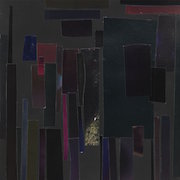Finding that perfect balance between experimental, avant-garde and accessible pop tendencies equals finding alchemical gold. Late Trish Keenan remarked that the avant-garde is no good without popular, and popular deemed rubbish without avant-garde. Katie Gately, LA-based sound-designer/producer turned musician, makes that uniqe alchemy seem effortless on her thrilling debut LP for Robin Carolan’s Tri Angle Records.
The ‘lead’ of found sounds, instrument samples, harshly industrial coded noise – spellbound by their author’s quietly enchanting soprano and elevated by the power of artistic vision of gigantic proportions – turns to muti-layered, heavily processed and painstakingly crafted gold of actual songs with serious (quasi) chart topping potential. Despite their EDM club appeal and pop sensibility, seven strikingly dynamic and expansive maximalist compositions are still locked in a very private headspace, a kind of solitude that contains multitudes.
Sonic reactionary’s nightmare and sonic adventurer’s dream come true, Gately’s aesthetic – heavily influenced by her past work experience in film industry and sound design – has expanded and evolved significantly, with increase in vocal and melodic hooks. Initial promising releases now seem almost restrained in their ambitious but grayscaled deconstruction – merely hinting at the creative supernova Color would become. Among the most sonically adventurous and unique records to emerge this year, Color is leaving Gately’s earlier ‘days of grey’ behind; reinventing the sonic color pallett with genre-obliterating diversity.
Gately is master of deep cinematic atmosphere and blessed with an uncanny sense of multidimensional musical space. Dreary, cabaret-like ‘Rive’, akin to Julia Holter’s hypnagogic lullabies and nine-minute closer ‘Color’, meditatively composed around deep breathing rhythm, offer much needed rest from a frantically paced thrill ride oversaturated with twisted earworms. Gately’s compositions take the longest route from A to B, trough a maze, a minefield of unpredictable pitch-shifting sounds, promising gold pot at the end of a panic attack. Everything here is hyperbole of a hyperbole of a hyperbole: her "49 percent obnoxious and 51 percent fun" formula of adding as much as possible before it becomes too much, works wonders when complemented with remarkably poised and graceful composition.
Though opener ‘Lift’ begins like a Holy Herndon song, it quickly ditches discipline for fun exploration and grows into a frantic chase with foley-like noise mixed with cartoonish aggression, playful poppy vocals and robust Yello aesthetic. The urgent, high drama terror of ‘Sire’s’ unrequited love threatens to tear at eardrums still sore from Anna Meredith’s ‘Nautilus’ (this year’s extraordinary Varmints being a close soulmate to Color in maximalist artistic credo).
Elsewhere, Gately is masterful in naturalising the inorganic and humanising the alien, making her noises onomatopoieically alive and vocal manipulations softened by the use of organic sounding Melodyne software. The artist is vocally present as comforting, unifying force, holographically contained in every particle of this anarchic symphony for the contemporary mind. Infosphere flooding our brains with conflicting intensity, prevents any meaningful linear comprehension. The highly idiosyncratic density of Color is comparable only to Clarence Clarity’s musical explorations of the plugged in mind.
Modest outward restraint, suggested by uniform brevity of one word song titles for example, hides deep inward complexity of uncharted depths of personality explored here . Like-minded music inventor with a similar penchant for mixing abrasive with ear-candy, Annie Clark once said in an interview: ‘there is nothing as weird as a person‘, or as interesting, lurking behind the facade of stiff normalcy, most dare not embrace, explore or show. Complexity of human experience is condensed in the sonic patchwork of Color, densely packed with divergent associations, rooted in quickly shifting, hyper-dynamic focus in a stream of consciousness manner: through the rabbit hole of the inner ear, you enter terra incognita of ghostly sounds with no discernible source. Here lies the power of the abstract to invoke the most intensely personal impressions and moments when we enjoy music the most. The listening experience is problematic here, though, if you approach it analytically instead of intuitively, surrendering to graceful shizophonia and letting the wild streams of consciousness break any barrage conventional songwriting tropes planted in your mind.
But no matter how hypnotic or dizzying, Color‘s power lies in the visceral imprints it leaves on our mind’s ear. Mutated beats and overbearing percussive noise point to the body’s rebellion against annihilation in some kind of post-human, post-body futurist utopia in which we will upload our minds and float off into cyberspace. The more prominent virtualisation of our selves is, the more intensely our deprived natural selves protest in all their joy and horror. Gately shows us what it would sound like if we could upload the totality of our being into hyperspace, making it intensely human and animated.
Color challenges the imperative of performing, conventionally tied to the idea of musicianship, as technical difficulties would prevent this powerhouse to ever take some stage by storm in the form it’s presented here. Music liberated from practical, physical imperatives, at best is free to explore and generate purely musical, novel ideas. At worst, ungrounded sonic fantasy, indulgent exercise in excessive, unhinged creativity.
Tomory Dodge’s cover artwork serves as a perfect visual representation of the album’s deeply ingrained idea: through dark shades of patchy composition, a bright green, moss-like centrepiece invites us inside, where light resides. At the heart of this dark, frightening dystopia lies a ferociously positive will to live. Or as Camus would put it: ‘In the middle of winter I at last discovered that there was in me an invincible summer.’


